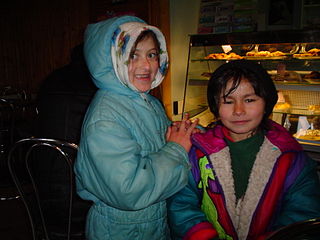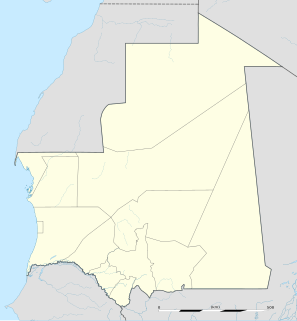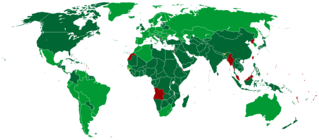The World Conference Against Racism (WCAR) is a series of international events organized by UNESCO to promote struggle against racism ideologies and behaviours. Four conferences have been held so far, in 1978, 1983, 2001, and 2009. Founded after World War II and the Holocaust as a dependent body of the United Nations, UNESCO started as soon as it was created to promote scientific studies concerning ethnic groups and their diffusion in public opinion to dispel pseudo-scientific rationalizations of racism. One of its first published works was The Race Question in 1950, signed by various internationally renowned scholars.
A United Nations General Assembly Resolution is a decision or declaration voted on by all member states of the United Nations in the General Assembly.
United Nations General Assembly Resolution 3379, adopted on 10 November 1975 by a vote of 72 to 35, "determine[d] that Zionism is a form of racism and racial discrimination". The vote took place approximately one year after UNGA 3237 granted the PLO Permanent Observer status, following PLO president Yasser Arafat's "olive branch" speech to the General Assembly in November 1974. The resolution was passed with the support of the Soviet bloc, in addition to the Arab- and Muslim-majority countries, many African countries, and a few others.

The United Nations General Assembly declared 2004 as the International Year to Commemorate the Struggle against Slavery and its Abolition.

UNITED for Intercultural Action is a European network against nationalism, racism, fascism and in support of migrants and refugees, in which over 560 organisations from 48 European countries cooperate. UNITED was founded in 1992 and provides a forum for active solidarity and cooperation between a wide variety of organisations in Europe and their activists across European borders.
The 2001 World Conference against Racism (WCAR), also known as Durban I, was held at the Durban International Convention Centre in Durban, South Africa, under UN auspices, from 31 August to 8 September 2001.

Doudou Diène of Senegal was United Nations Special Rapporteur on contemporary forms of racism, racial discrimination, xenophobia and related intolerance in 2002–2008.
The United Nations Decade for Women was a period from 1975 to 1985 focused on the policies and issues that impact women, such as pay equity, gendered violence, land holding, and other human rights. It was adopted December 15, 1975,by the United Nations General Assembly by Resolution 31/136.

Ukraine is a multi-ethnic and multicultural nation where racism and ethnic discrimination has arguably been a largely fringe issue in the past, but has had a climb in social influence due to ultra-nationalist parties gaining attention in recent years. However, there have been recorded incidents of violence where the victim's race is widely thought to have played a role. Those incidents receive extensive media coverage and are usually condemned by all mainstream political forces. Human Rights Watch reported that "racism and xenophobia remain entrenched problems in Ukraine". In 2012 the European Commission against Racism and Intolerance (ECRI) reported that "tolerance towards Jews, Russians and Romani appears to have significantly declined in Ukraine since 2000 and prejudices are also reflected in daily life against other groups, who experience problems in accessing goods and services".

In 1972, the United Nations General Assembly decided to institute a World Development Information Day coinciding with United Nations Day on October 24. The General Assembly had the object of drawing the attention of world public opinion each year to development problems and the necessity of strengthening international co-operation to solve them.
The Durban Review Conference is the official name of the 2009 United Nations World Conference Against Racism (WCAR), also known as Durban II. The conference ran from Monday 20 April to Friday 24 April 2009, and took place at the United Nations Office in Geneva, Switzerland. The conference was called under the mandate of United Nations General Assembly resolution 61/149 with a mandate to review the implementation of The Durban Declaration and Programme of Action from the 2001 World Conference against Racism, Racial Discrimination, Xenophobia and Related Intolerance which took place in Durban, South Africa.

El Mina is a suburb of Nouakchott and urban commune in western Mauritania. It has a population of 95,011.
European Commission against Racism and Intolerance (ECRI) is the Council of Europe’s independent human rights monitoring body specialised in combating antisemitism, discrimination, racism, religious intolerance, and xenophobia. It publishes periodic reports on CoE member states and general policy recommendations. The decision to found ECRI was adopted in 1993. The organization became officially active as of March 1994.
Ulrika Sundberg is a Swedish diplomat. Her most recent appointment is Sweden's ambassador to Ireland and previously to Belgium and Pakistan.
Defamation of religion is an issue that was repeatedly addressed by some member states of the United Nations (UN) from 1999 until 2010. Several non-binding resolutions were voted on and accepted by the UN condemning "defamation of religion". The motions, sponsored on behalf of the Organization of the Islamic Conference (OIC), now known as the Organisation of Islamic Cooperation, sought to prohibit expression that would "fuel discrimination, extremism and misperception leading to polarization and fragmentation with dangerous unintended and unforeseen consequences". Religious groups, human rights activists, free-speech activists, and several countries in the West condemned the resolutions arguing they amounted to an international blasphemy law. Critics of the resolutions including human rights groups argued that they were used to politically strengthen domestic anti-blasphemy and religious defamation laws, which are used to imprison journalists, students and other peaceful political dissidents.
Expression of racism in Latvia include racist discourse by politicians and in the media, as well as racially motivated attacks. European Commission against Racism and Intolerance notes some progress made in 2002–2007, mentioning also that a number of its earlier recommendations are not implemented or are only partially implemented. The UN Special Rapporteur on contemporary forms of racism, racial discrimination, xenophobia and related intolerance highlight three generally vulnerable groups and communities: ethnic Russians who immigrated to Latvia under USSR, the Roma community and recent non-European migrants. Besides, he notes a dissonance between "opinion expressed by most State institutions who view racism and discrimination as rare and isolated cases, and the views of civil society, who expressed serious concern regarding the structural nature of these problems".
Durban III is an informal name for a high-level United Nations General Assembly meeting marking the 10th anniversary of the adoption of The Durban Declaration and Programme of Action that was held in New York City on 22 September 2011. It was mandated in 2009 by United Nations General Assembly (GA) resolution 64/148 to commemorate the World Conference against Racism 2001, and given additional form and visibility by a GA Third Committee draft resolution adopted on 24 November 2010. It followed the Durban Review Conference, the official name of the 2009 United Nations World Conference Against Racism (WCAR), also known as Durban II.

The International Convention on the Elimination of All Forms of Racial Discrimination (ICERD) is a United Nations convention. A third-generation human rights instrument, the Convention commits its members to the elimination of racial discrimination and the promotion of understanding among all races. The Convention also requires its parties to outlaw hate speech and criminalize membership in racist organizations.

The United Nations General Assembly Third Committee is one of six main committees at the General Assembly of the United Nations. It deals with human rights, humanitarian affairs and social matters.

E. Tendayi Achiume is a Professor of Law and Faculty Director of the Promise Institute for Human Rights at University of California, Los Angeles. She serves as the United Nations special rapporteur on Racism, Racial Discrimination, Xenophobia and Related Intolerance.